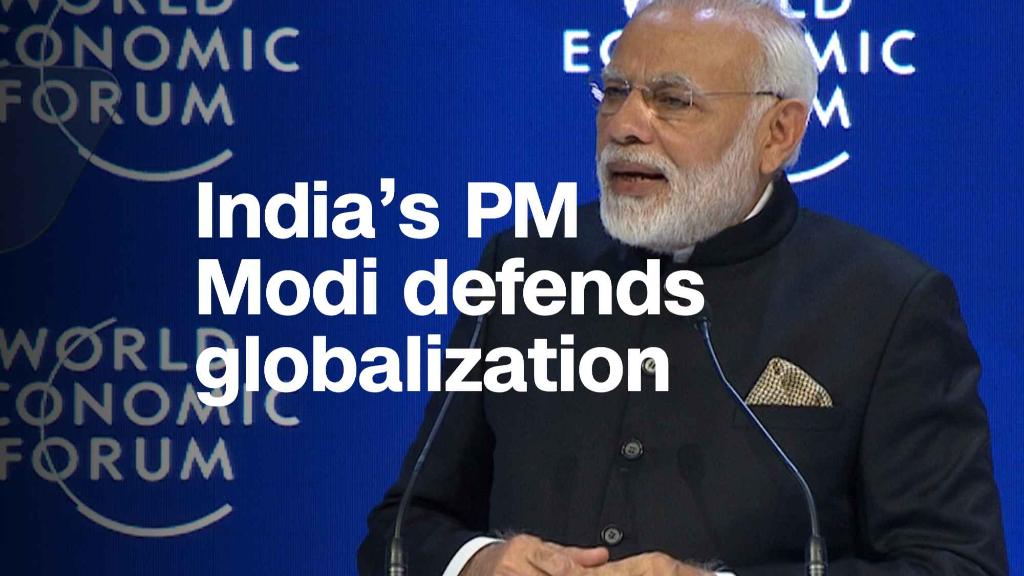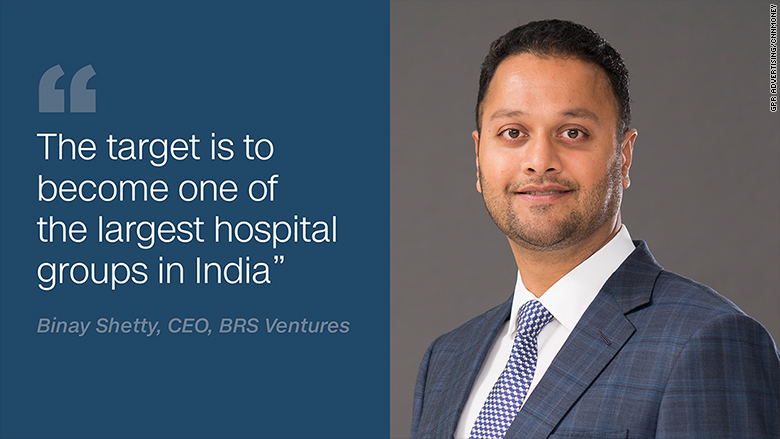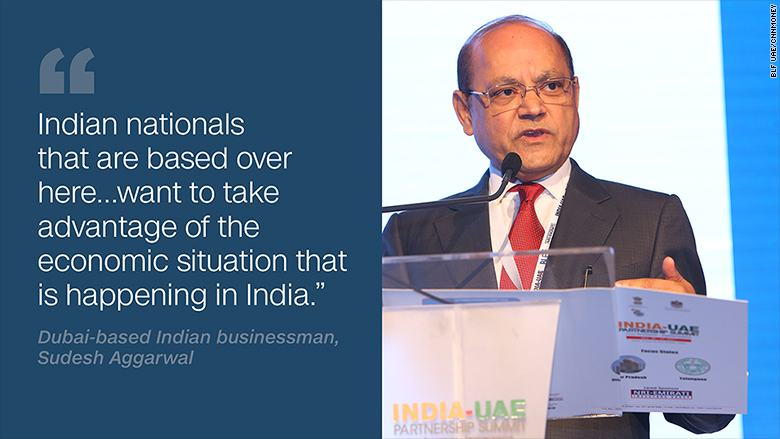
For decades, millions of Indians emigrated to the Middle East to make money. Now many of them are investing their profits back home, encouraged by Prime Minister Narendra Modi's overhaul of the economy.
Several prominent businessmen in the United Arab Emirates -- home to the world's largest Indian diaspora -- have committed billions to India in the past three years. Modi's business-friendly policies are encouraging others.
"We've always been hesitant to invest in India just because the bureaucracy was too much and corruption was too much," said Binay Shetty, CEO of BRS Ventures. "But when the new government came in, they started changing this and we took a view that we wanted to expand," he told CNNMoney.
Related: Millions more companies are now paying tax in India
Shetty's father left India in 1973 for the UAE, where he first worked as a medical supplies salesman. Two years later, he launched a clinic and distribution company in Abu Dhabi, eventually building a network of hospitals across the UAE. The company, NMC Health (NMHLY), listed on the London Stock Exchange in 2012 and is now worth $8.5 billion.
BRS Ventures wants to replicate that success in India. It acquired several hospitals over the past few years with 1,000 beds in total. Shetty's aim is to add at least another 4,000 beds over the next five years.
"The target is to become one of the largest hospital groups in India," he said. The company is also looking towards India for other sectors it operates in, including pharmaceuticals, education and financial services. It plans to invest $300 million over the next two years.
Modicare: India plans free healthcare for 500 million
Prime Minister Modi is guest of honor at the World Government Summit in Dubai, starting Sunday. Since taking office in 2014, he has pledged to boost India's growth and slash the country's notorious red tape.
He's had mixed results with the former, but recent moves to relax retail restrictions and overhaul the tax system have cheered foreign investors.
India jumped 30 spots in the World Bank's ease of doing business ranking released last November. Some analysts have questioned the reliability of the ranking, but Modi and his government have touted it as a ringing endorsement of their policies.

Sudesh Aggarwal, a Dubai-based Indian businessman who sits on the board of the UAE Business Leaders Forum, said the World Bank's seal of approval has boosted investor sentiment.
The forum says 100 expat Indians have pooled $1 billion to invest in India.
They are open to investing in a variety of sectors such as healthcare, education, solar power and infrastructure, Aggarwal told CNNMoney, adding that the group is looking to "join hands" with state governments to work on specific projects.
"The question is what the state governments want for their states, we work according to that," he said.
Several other companies started by Indians based in the UAE are also expanding their footprint back home.

The Lulu Group, best known for its chain of supermarkets, already operates malls, convention centers and hotels across southern India and has several new projects in the pipeline. KEF Holdings, a construction firm that specializes in prefabricated buildings, has invested in four Indian projects worth around $180 million since 2016.
Aster, a Dubai-based healthcare firm, is reportedly planning an IPO on the Bombay Stock Exchange next week.
"There is absolutely no doubt that several major UAE-based Indians are now making major investments into India," said Navdeep Singh Suri, India's ambassador to the UAE.
"Business is driven only partly by patriotism, it is principally driven by returns and by ease of doing business," Suri told CNNMoney. "Along with the growth of the Indian economy, [investors] also see that it is becoming easier."
Related: Modi tells Davos globalization is under attack
The affection is mutual, and with good reason. More than 3 million Indians live in the UAE, according to the United Nations. (Only Mexicans in the United States constitute a larger immigrant population between two countries.)
The UAE accounts for the largest proportion of remittances sent to India, estimated at almost $13 billion in 2016.
Modi's visit in 2015 was the first by an Indian prime minister to visit the Gulf state in 34 years. The crown prince of Abu Dhabi, Mohammed bin Zayed Al Nayhan, has visited India twice since then.
State money is flowing east, too. The UAE government has committed $75 billion towards developing Indian infrastructure, with the Abu Dhabi Investment Authority and Dubai port operator DP World inking deals worth $1 billion and $3 billion respectively in recent months.
And Emirates Airline just announced an agreement with Indian state Andhra Pradesh to help develop its aviation sector.
There's probably a lot more deals to come.
"We've really [only] scratched the surface," said Suri. "This is a very capital rich country, and as returns weaken in Western markets, India -- with its combination of growth, scale and stability -- is a very attractive opportunity."


